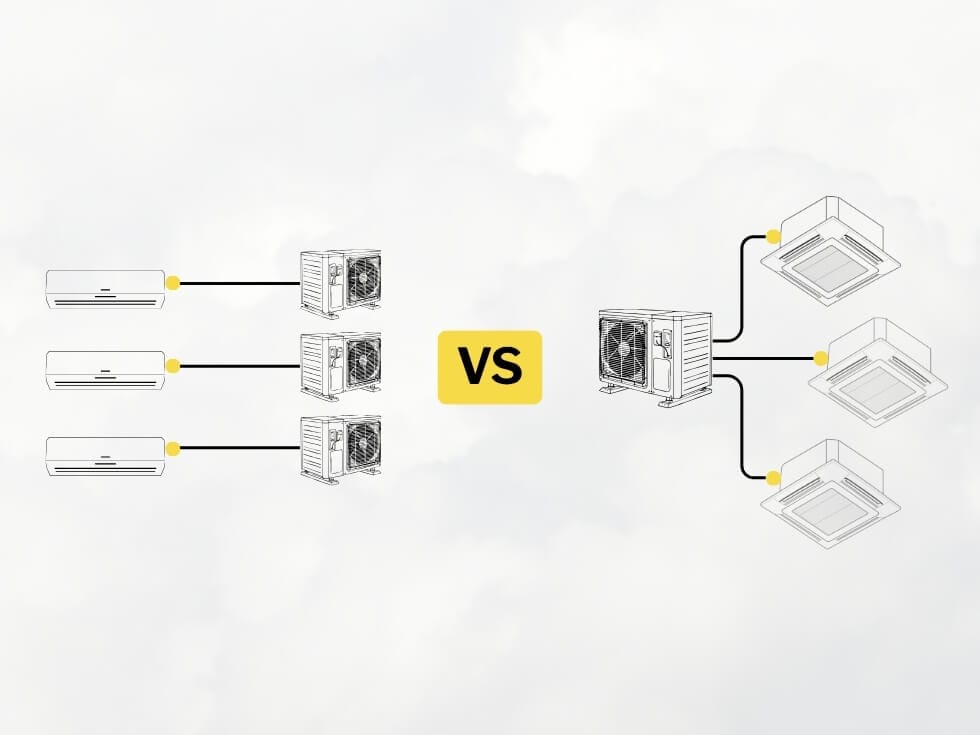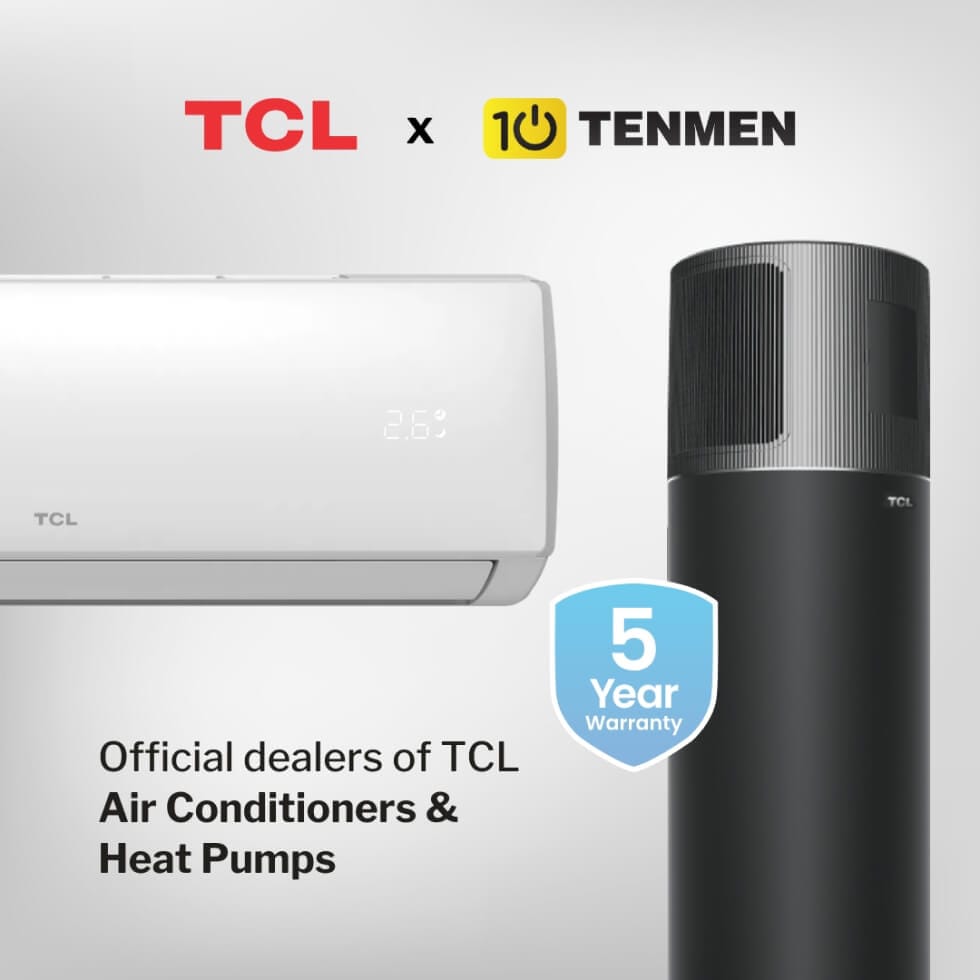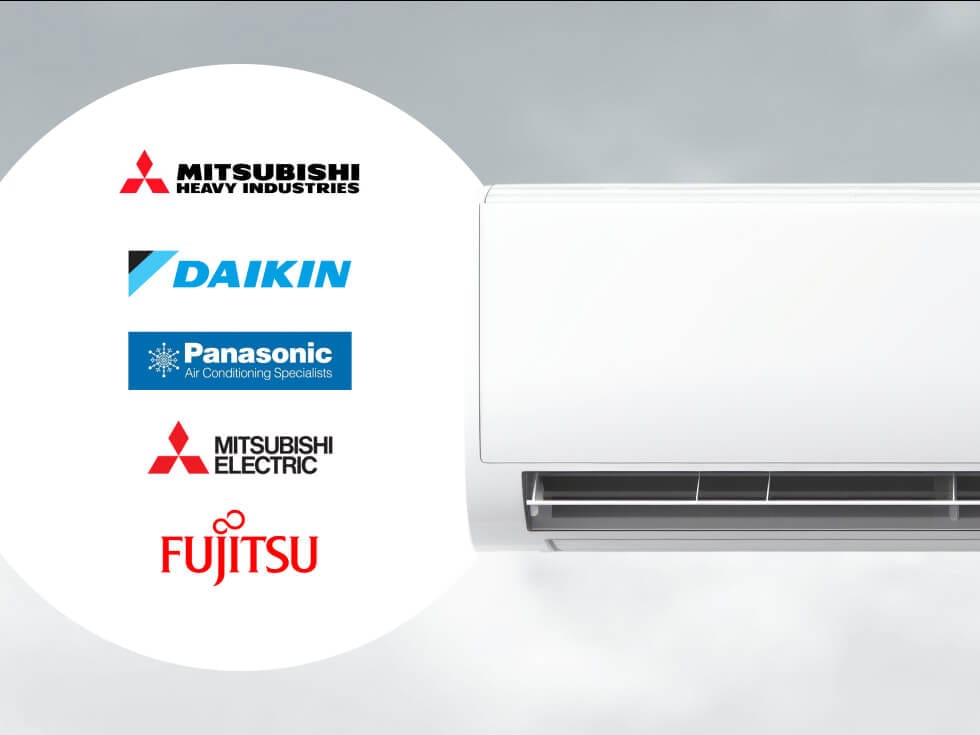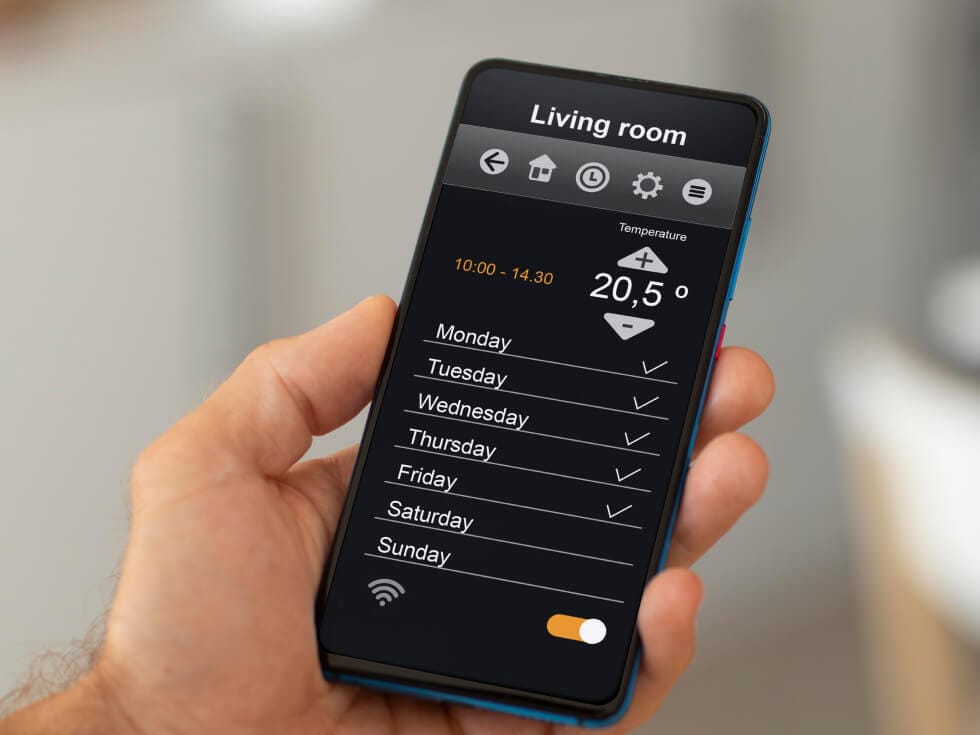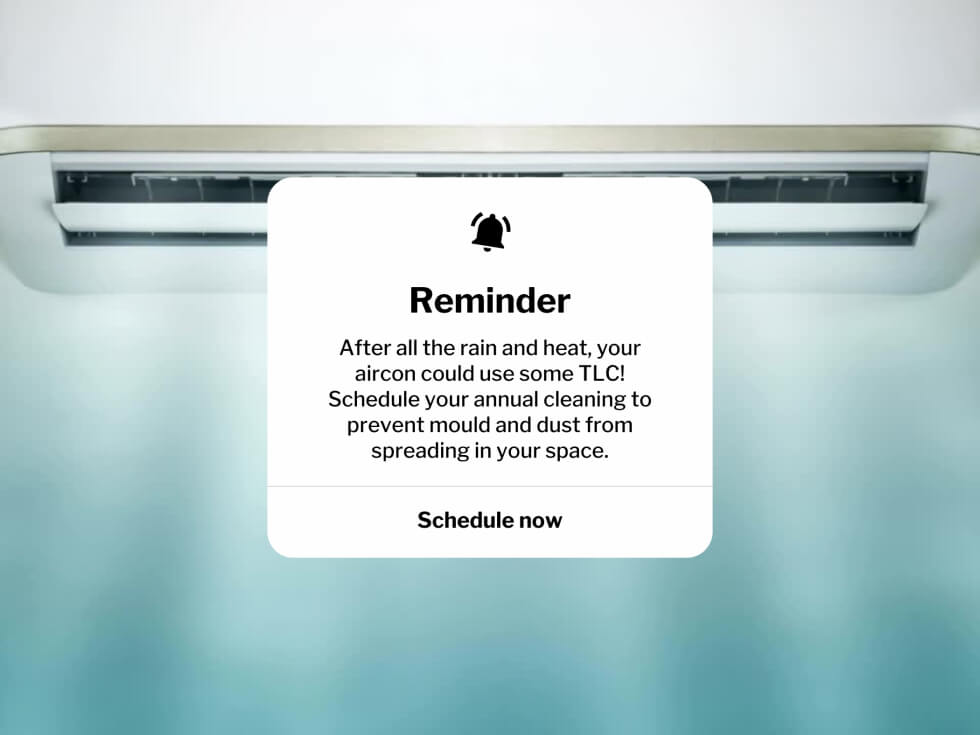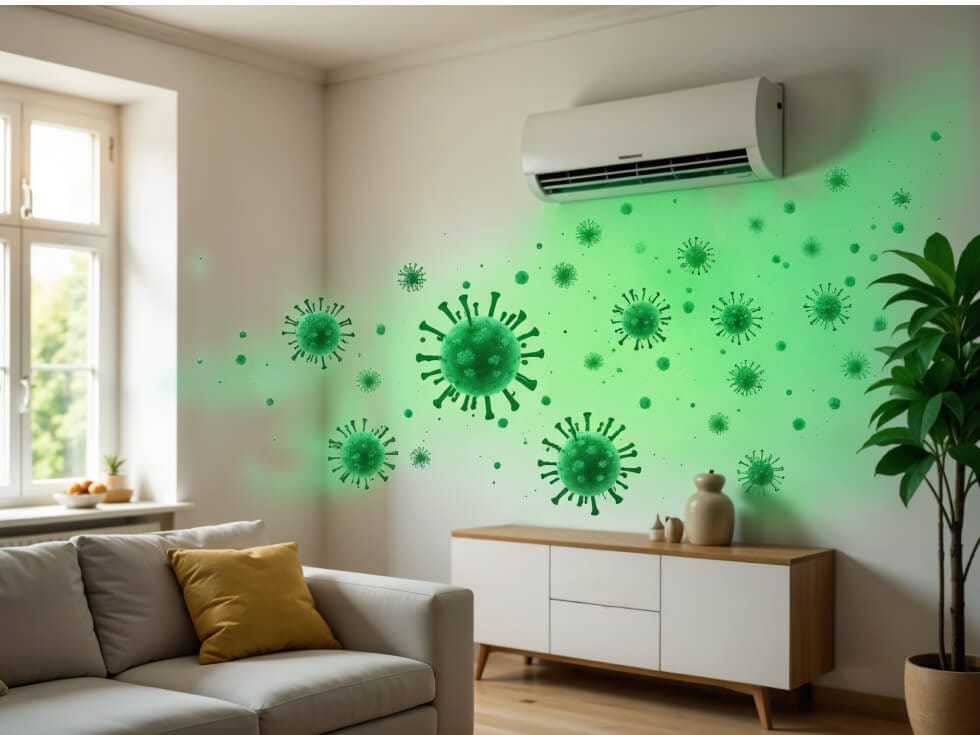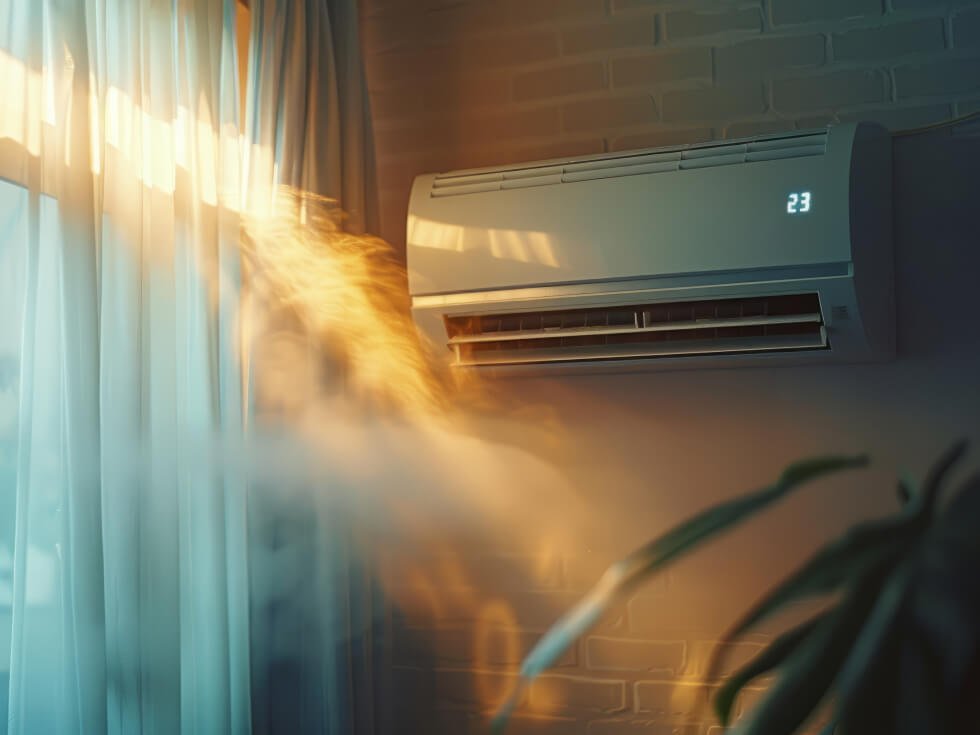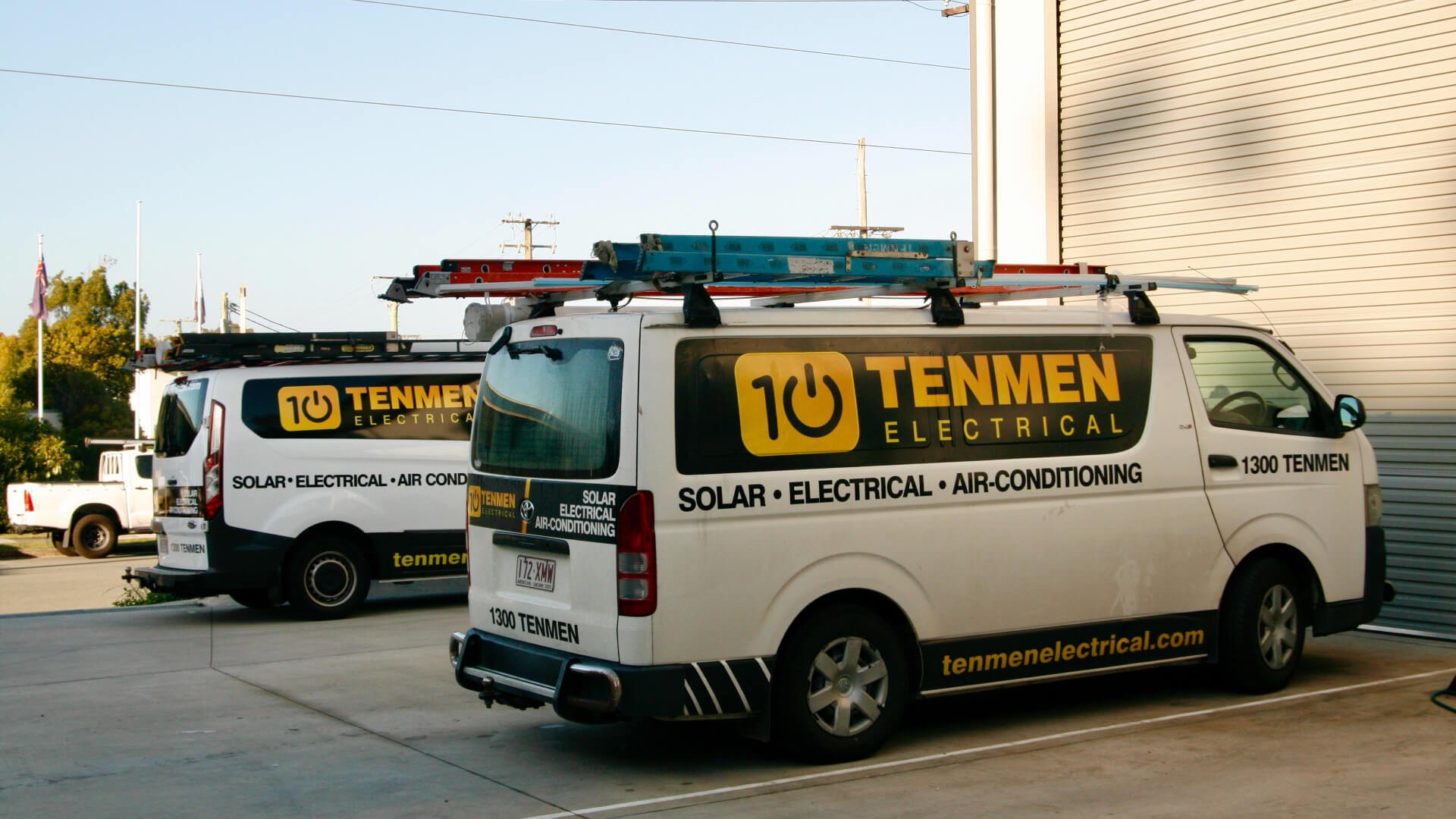You might be looking for an air conditioning on the Sunshine Coast, where the weather is warm all year round. Choosing between a ducted air conditioner and a split system can really affect your comfort, your energy bills, and even how your home or business looks.
In this guide, we’ll keep things simple. You’ll learn how ducted and split systems work, see how they stack up on things like installation, running costs, and maintenance, and get the key pros and cons of each. Whether you need to cool just one room or your entire place, you’ll have the information you need to pick the right system for your needs.
Key Takeaways
Tenmen’s experience: split systems win for budget-conscious projects; ducted is the go-to for large homes wanting a polished look.
- Split systems offer lower upfront and installation costs, ideal for 1–3 zones.
- Ducted systems deliver seamless whole-home comfort but come with higher equipment and labour fees.
- Running costs favour split systems when you only need a few rooms; ducted shines under constant, full-home use.
- Maintenance on split systems is simple and inexpensive; ducted requires specialist servicing and periodic duct cleaning.
- Tenmen’s experience: split systems win for budget-conscious projects; ducted is the go-to for large homes wanting a polished look.

How Split System and Ducted Air Conditioners Work
Split-System Air Conditioners
- Configuration: One indoor head (evaporator and fan) mounted on a wall or ceiling, paired with one outdoor compressor/condenser unit.
- Operation: The indoor head draws in room air, cools or heats it via refrigerant flow, and circulates it back into the space. The outdoor unit expels heat (or extracts heat in reverse-cycle mode) to the outside air .
- Use Cases: Perfect for individual rooms or small zones—bedrooms, home offices, retail fit-outs, or any space where you only need targeted climate control.
- Benefits: Simple two-component design makes installation quick and affordable, with independent control of each zone so you only run the units you need, minimising wasted energy.

Ducted Air Conditioning
- Configuration: A single, centrally located compressor unit (usually in the roof cavity or under-floor) connected to a network of concealed ducts and vents in each room.
- Operation: Conditioned air is pushed through the ductwork and out vents into each zone. Dampers or zone controllers adjust airflow so you can cool or heat different areas from one system.
- Use Cases: Ideal for whole-home comfort or multi-zone applications where you want a seamless interior (no visible heads) and the ability to manage multiple rooms from a central thermostat.
- Benefits: Delivers uniform temperature throughout your property, hides all equipment out of sight for a clean aesthetic, and simplifies control with a single system handling every zone.

Split-System vs Ducted Air Conditioning Comparison
| Factor | Split System | Ducted System |
|---|---|---|
| Coverage & Zoning | • One head per room—ideal for targeted control of 1–3 zones • Switch off unused units to save energy | • Central unit serves entire home or up to 8+ zones • Dampers let you customise which areas get conditioned |
| Upfront & Installation | • Simple two-component install—short pipe runs and quick electrician-led hookup • Lower equipment cost per zone | • Requires ductwork, ceiling/floor modifications and multiple trades • Higher equipment and labour investment |
| Running Costs | • Run only the heads you need—no wasted energy in empty rooms • Inverter models minimise power draw at low loads | • Very efficient when cooling the whole house • Duct losses can increase costs if only a few zones are used |
| Energy Efficiency | • Right-sized per room for minimal standby loss • High COP/SEER ratings on individual units | • Balanced airflow keeps temperature even throughout • Real-world efficiency depends on duct insulation quality |
| Maintenance & Repairs | • DIY filter cleaning every 1–3 months • Isolated faults—one unit down doesn’t impact others | • Specialist duct cleaning every 2–3 years • Central unit servicing required; repairs can be costlier |
| Aesthetics & Space | • Visible indoor heads and one outdoor per zone—can clutter façades • Each head located near its room for easy concealment | • All equipment hidden—only discreet vents show • Single outdoor unit keeps exterior clean and uncluttered |
Split-System Air Conditioner Pros & Cons
Pros:
- Budget-friendly: Lower purchase price and simpler install keep upfront costs down.
- Targeted control: Run only the zones you need—no energy wasted cooling empty rooms.
- Easy maintenance: DIY filter cleaning and inexpensive parts mean low ongoing service bills.
- Modular scalability: Add or relocate heads as your needs change without massive hassle.
Cons:
- Visible hardware: Indoor heads on walls and multiple outdoor compressors can clutter your façade.
- Aggregate cost for many zones: For homes with several zones, multiple split systems can cost nearly as much as ducted, depending on the setup.
- Separate controls: Each head has its own remote or app—no single unified interface without extra equipment.
Ducted Air Conditioning Pros & Cons
Pros:
- Whole-home comfort: One system delivers balanced cooling/heating to every room via concealed vents.
- Clean aesthetics: No wall-mounted heads—only discreet ceiling or floor grilles are visible.
- Long lifespan: With proper servicing, ducted systems can run efficiently for 15–20 years.
- Centralised control: Manage multiple zones from one or two thermostats—ideal for large homes.
Cons:
- High upfront investment: Equipment, ductwork, and labour costs far exceed split system heads.
- Invasive installation: Requires ceiling or under-floor work and co-ordination among multiple trades.
- Specialist servicing: Duct cleaning and central unit repairs need qualified technicians and can be pricey.
- Less flexibility: Once installed, adding zones or relocating vents is costly and disruptive.
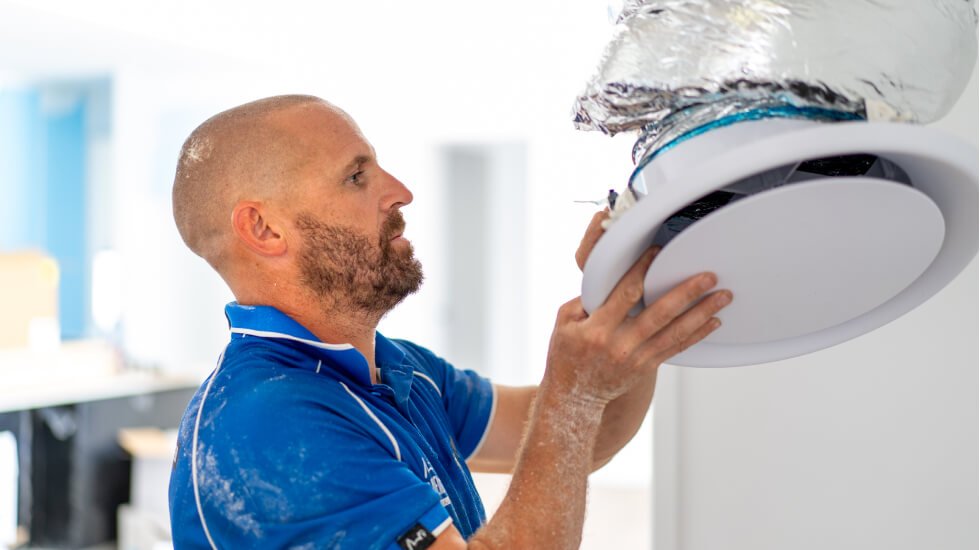
Tenmen’s Case for Ducted vs Split System
At Tenmen Electrical, we’ve installed hundreds of air-conditioning systems across the Sunshine Coast, and here’s what we see working best for our clients:
Split-System Wins When:
- You need 1–3 zones. Installing individual heads is far more budget-friendly than running ductwork.
- Quick turnaround matters. Electrician-led installs with minimal drilling mean less disruption to your home or business.
- Simplicity is key. DIY filter cleaning and isolated unit servicing keep maintenance stress—and bills—low.
Ducted System Shines When:
- Whole-home comfort is the goal. One hidden unit plus ducts gives even temperature across every room.
- You value clean lines. No wall heads or multiple outdoor compressors—just discreet vents and a single condenser.
- Long-term investment. Built to last, ducted systems can deliver reliable service for up to two decades with proper care.
Cost Considerations
Installing ductwork and a central unit might seem like a one-stop solution, but the combined equipment and labour costs often eclipse the total for several split system heads. Always compare quotes side by side.
Installation Complexities: Invasive vs Streamlined
Ducted installs involve ceiling or under-floor work, multiple trades, and longer project timelines. Split systems need only a small wall penetration per head and can often be completed in a single day.
Maintenance and Faults: One vs Many
With ducted, a central unit fault can leave every vent silent until fixed. Split systems confine issues to individual zones, letting the rest of your home stay comfortable while you repair or service a single head.
Next Steps
Whether you choose the ducted path for whole-home elegance or the split system route for budget-friendly, targeted control, Tenmen Electrical is here to guide you.
- Map Your Zones and Requirements: Think about which rooms need cooling or heating the most. Consider how often each space is used and whether everyone at home has different preferences.
- Contact Tenmen: Contact us for a free consultation and let our certified team evaluate and propose the best air-conditioning solution for your home or business.
- Compare Quotes: Use the info we provide to compare with other quotes. Look beyond price — check what’s included, system efficiency, installation quality, and how well the solution fits your lifestyle.
- Make an Informed Decision: Choose the system and installer that gives you the right mix of comfort, energy efficiency, warranty coverage, installer reputation, and ongoing support. Your long-term satisfaction matters most.
FAQ
What is the main difference between ducted and split system air conditioners?
A ducted system uses a central compressor and distributes conditioned air through a network of concealed ducts and vents, offering whole-home or multi-zone comfort. A split system consists of individual indoor heads in each room, each paired with its own outdoor compressor and running independently.
Which is more cost-effective: ducted or split system air conditioning?
Split systems generally have lower upfront and installation costs per zone because they require only a simple two-unit install for each head. Ducted systems involve ductwork throughout the home and more extensive labour, making them more expensive to install, though they can deliver better value if you plan to run cooling or heating across your entire property regularly.
Do ducted systems waste energy compared to split units?
When you only need to cool or heat a couple of rooms, ducted systems can lose energy through ducts serving unused areas. Split systems let you operate just the heads you need, avoiding wasted conditioning. However, if you’re running multiple zones all day long, ducted systems can be more efficient thanks to balanced airflow and centralised operation.
How does maintenance differ between ducted and split system air conditioners?
Split systems require routine filter cleaning every few months and occasional servicing of each head, with repairs generally being quick and inexpensive. Ducted systems need specialist duct cleaning periodically and professional servicing of the central unit, which can be more involved and carry higher service fees when ductwork or the compressor needs attention.
Is a split system better for apartments and small homes?
Yes. Split systems are ideal where installing ducts is impractical or too invasive. The installation is usually quick with minimal disruption, requires no ceiling or under-floor modifications, and offers flexibility to add or relocate heads as your needs change, making them a popular choice for apartments and smaller properties.

